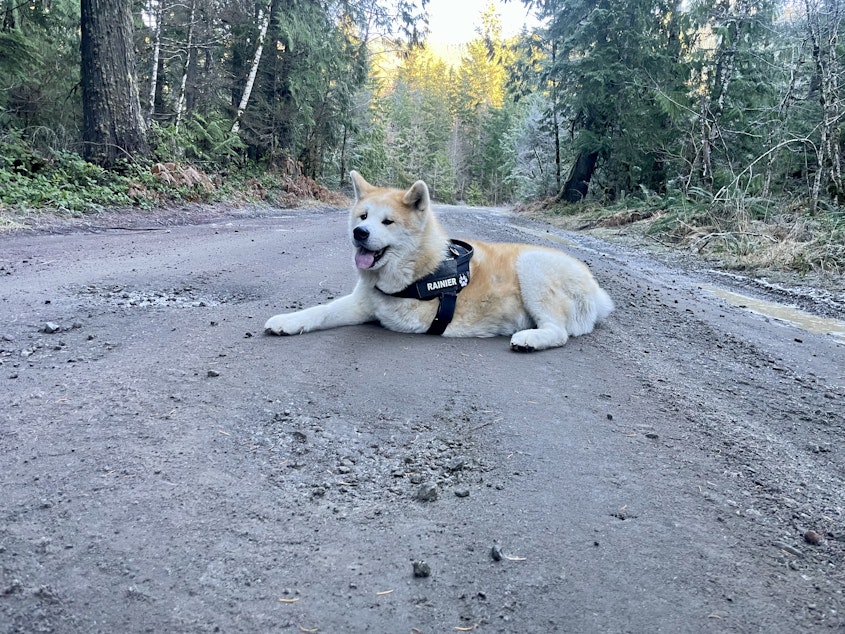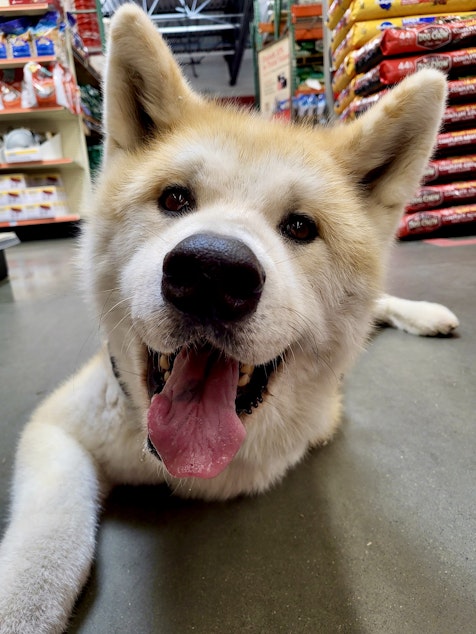Immunotherapy for dogs? Seattle-based nonprofit backs promising canine cancer vaccine

When Kasey Bentz noticed her 8-year-old Akita, Rainier, was limping, her first thought was, "Here we go again."
Rainier had already had three knee surgeries. Bentz and her husband jokingly referred to him as the $60,000 dog.
But the news from the urgent care vet this time around was more dire. Rainier had bone cancer.
“We were told he had about two months to live and to give him the best life for a few months,” Bentz recalled. “I was devastated.”
Bentz is a police investigator with the special assault unit at the Lakewood Police Department. She is not the type to sit back and let things happen.
She got a second opinion and took Rainier to have his front right leg amputated and undergo chemotherapy. During a follow-up visit, Bentz overheard two oncologists talking about an immunotherapy trial at Washington State University's Veterinary Teaching Hospital. When they finished their conversation, she asked one of the oncologists for more details, made a call, and got Rainier added to the trial.
In Pullman, Rainier was given two doses of the EGFR/HER2 vaccine developed by a Yale University research team led by Mark Mamula. When Rainier’s cancer came back a year later, this time in his lungs, Bentz called Mamula directly. He authorized a booster shot of the same immunotherapy vaccine.
Sponsored
In April, Rainier was having GI problems, and Bentz took him in, fearing the worst. When the oncologist came out, Bentz braced herself, expecting to hear that Rainier’s lung cancer had spread.
“She said, ‘We have some incredible news. There’s no more mass in Rainier’s lungs or anywhere else that we could see,’” Bentz said. “I don't even know if it made sense to me at first. After I caught on to what she was saying, I asked, ‘Can you make sure?’ Because I don't want to have all this hope if that isn't the case. They confirmed there's nothing from the imaging they did that day. There's no signs of cancer.”

Bentz is one of the dog owners who have seen remarkable results from an immunotherapy vaccine trial supported in part by a Seattle nonprofit called Canine Cancer Alliance. The group was founded in 2017 by Mari Maeda, a retired executive at DARPA, the Department of Defense agency credited with creating the earliest version of the internet, as well as other cutting-edge technologies.
In her last job at DARPA, Maeda was a program manager who led major innovation programs in national security. She brought those skills to address what she saw as inadequacies in canine cancer treatment after she lost three of her own dogs to cancer.
Sponsored
“I just started asking myself, ‘Why aren’t there better treatments for dogs, and why aren’t their clinical trials open in the Seattle area, since we have so many family and dog lovers here?’” Maeda said. “Why don’t we have better treatment for dogs and why not here?”
RELATED: At this Seattle dog cafe, pups get indoor playtime and plenty of treats
Many of the Canine Cancer Alliance board members are also former DARPA employees who share her love of dogs, Maeda said.
“We're using the techniques that we used to start projects, manage projects, to get results, to help dogs,” she said.
In eight years, the Canine Cancer Alliance has raised money to support eight different projects, including the EGFR/HER2 canine cancer vaccine trial. The group funds Yale researchers and provides money to TheraJan, the company manufacturing the vaccine, to ensure that research and production continue.
Sponsored
So far, the vaccine has been given to 600 dogs at 11 clinics across the U.S., including two in Washington state — Bridge Animal Referral Center in Edmonds and the WSU Veterinary Teaching Hospital in Pullman.

The vaccine is being used on dogs with three types of cancer — osteosarcoma, hemangiosarcoma, and urothelial carcinoma, a form of bladder cancer.
Cancer is the top cause of death for dogs. One in three dogs will be diagnosed with cancer in their lifetime. Because dogs can’t speak human, their cancers often aren't discovered until they are more advanced and harder to treat.
“They are very good at hiding pain,” Maeda said. “So for example, osteosarcoma, you notice when they start limping or licking their leg, and by the time it's diagnosed, it's already started to metastasize.”
Sponsored
RELATED: Doggles and dog booties: Anchorage residents prep pets for volcanic explosion
The one-year survival rate for dogs with osteosarcoma is about 35%, but, with the immunotherapy vaccine, that number has almost doubled to 65%, Maeda said.
Maeda believes that, by combining different immunotherapy drugs, the survival rate could increase to 90% or even higher. She also believes the shot could help dogs avoid losing limbs as part of their treatment.
“We already have evidence of almost a year survival time without surgery, with palliative radiation and vaccine,” she said. “So, there’s going to be a future where an amputation is not going to be necessary.”
In addition to improved outcomes, Maeda is also focused on lowering the cost of cancer care for dogs and improving accessibility. Radiation for dogs can cost $10,000. Surgery and chemo can run from $10,000 to $20,000.
Sponsored
In contrast, the immunotherapy vaccine and palliative radiation offered at WSU as part of the trial cost around $1,500 and the median survival is almost a year. Some researchers believe surgery, radiation, and chemo might be replaced by gentler and more effective immunotherapy.
In terms of access, canine cancer treatments are limited to specialty clinics with veterinary oncologists. Maeda hopes the immunotherapy treatments will eventually be provided at regular veterinary clinics.

 15 secs
Rainier hangs out by the lake near his home in Roy, Washington. The 9-year-old Akita has survived two bouts of cancer thanks in part to an immunotherapy vaccine for dogs.
15 secs
Rainier hangs out by the lake near his home in Roy, Washington. The 9-year-old Akita has survived two bouts of cancer thanks in part to an immunotherapy vaccine for dogs.
As for Rainier, Bentz said he is back to his old ways of chasing animals at the edge of the lake behind their house in Roy, Washington, south of Tacoma. She said the staff at the pet hospital have taken to calling him “Benjamin Button,” because he has seemingly turned back time.
“He’s doing amazing,” Bentz said. “He has puppy energy now.”




